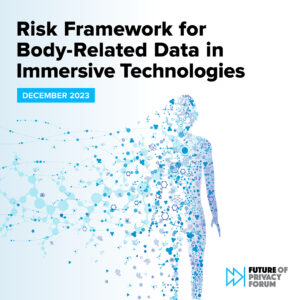Organizations are increasingly developing or deploying “immersive technologies,” a collection of hardware and software products that substitute, enhance, or alter users’ individual, physical-world experiences. These emerging technologies—which include tools like extended reality (XR), virtual worlds, and brain-computer interfaces (BCIs)—have the potential to transform healthcare, education, entertainment, advertising, and other sectors. However, because they often rely on large amounts and kinds of personal, potentially sensitive data, they also raise important privacy and data protection questions. Without safeguards, data about people’s bodies, behaviors, and surrounding environments could be inferred and used to manipulate, discriminate against, or otherwise harm both users and bystanders. FPF works with experts from industry, academia, and civil society to identify the unique privacy and data protection risks in this nascent field, analyze how existing and emerging regulations implicate immersive technologies, and develop best practices and policy recommendations.
Featured
Old Laws & New Tech: As Courts Wrestle with Tough Questions under US Biometric Laws, Immersive Tech Raises New Challenges
Extended reality (XR) technologies often rely on users’ body-based data, particularly information about their eyes, hands, and body position, to create realistic, interactive experiences. However, data derived from individuals’ bodies can pose serious privacy and data protection risks for people. It can also create substantial liability risks for organizations, given the growing volume of lawsuits […]
Understanding Extended Reality Technology & Data Flows: Privacy and Data Protection Risks and Mitigation Strategies
This post is the second in a two-part series. Click here for FPF’s XR infographic. The first post in this series focuses on the key functions that XR devices may feature, and analyzes the kinds of sensors, data types, data processing, and transfers to other parties that power these functions. I. Introduction Today’s virtual (VR), […]
Understanding Extended Reality Technology & Data Flows: XR Functions
This post is the first in a two-part series on extended reality (XR) technology, providing an overview of the technology and associated privacy and data protection risks. Click here for FPF’s infographic, “Understanding Extended Reality Technology & Data Flows.” I. Introduction Today’s virtual (VR), mixed (MR), and augmented (AR) reality environments, collectively known as extended […]
New Infographic Highlights XR Technology Data Flows and Privacy Risks
As businesses increasingly develop and adopt extended reality (XR) technologies, including virtual (VR), mixed (MR), and augmented (AR) reality, the urgency to consider potential privacy and data protection risks to users and bystanders grows. Lawmakers, regulators, and other experts are increasingly interested in how XR technologies work, what data protection risks they pose, and what […]
FPF and Singapore PDPC Event: “Data Sovereignty, Data Transfers and Data Protection – Impact on AI and Immersive Tech”
On July 21, the Future of Privacy Forum (FPF) and Singapore’s Personal Data Protection Commission (PDPC) co-hosted a workshop as part of Singapore’s Personal Data Protection Week, titled “Data Sovereignty, Data Transfers and Data Protection – Impact on AI and Immersive Tech” at Marina Bay Sands Expo and Convention Center in Singapore. The event focused […]
BCI Technical and Policy Recommendations to Mitigate Privacy Risks
This is the final post of a four-part series on Brain-Computer Interfaces (BCIs), providing an overview of the technology, use cases, privacy risks, and proposed recommendations for promoting privacy and mitigating risks associated with BCIs. Click here for FPF and IBM’s full report: Privacy and the Connected Mind. In case you missed them, read the […]
BCI Commercial and Government Use: Gaming, Education, Employment, and More
This post is the third in a four-part series on Brain-Computer Interfaces (BCIs), providing an overview of the technology, use cases, privacy risks, and proposed recommendations for promoting privacy and mitigating risks associated with BCIs. Click here for FPF and IBM’s full report: Privacy and the Connected Mind. In case you missed them, read the […]
BCIs & Data Protection in Healthcare: Data Flows, Risks, and Regulations
This post is the second in a four-part series on Brain-Computer Interfaces (BCIs), providing an overview of the technology, use cases, privacy risks, and proposed recommendations for promoting privacy and mitigating risks associated with BCIs. Click here for FPF and IBM’s full report: Privacy and the Connected Mind. In case you missed it, read the […]
Brain-Computer Interfaces & Data Protection: Understanding the Technology and Data Flows
This post is the first in a four-part series on Brain-Computer Interfaces (BCIs), providing an overview of the technology, use cases, privacy risks, and proposed recommendations for promoting privacy and mitigating risks associated with BCIs. Click here for FPF and IBM’s full report: Privacy and the Connected Mind. Additionally, FPF-curated resources, including policy & regulatory […]
Organizations must lead with privacy and ethics when researching and implementing neurotechnology: FPF and IBM Live event and report release
A New FPF and IBM Report and Live Event Explores Questions About Transparency, Consent, Security, and Accuracy of Data The Future of Privacy Forum (FPF) and the IBM Policy Lab released recommendations for promoting privacy and mitigating risks associated with neurotechnology, specifically with brain-computer interface (BCI). The new report provides developers and policymakers with actionable […]











